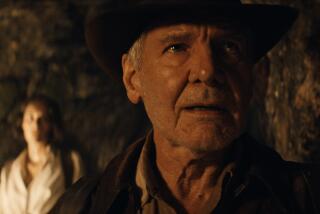One Man Is a ‘Lonely Planet’ in the Age of AIDS
Maps help make sense of a landscape, but they don’t tell the whole story. They’re often skewed for particular perspectives and purposes.
So says Jody, the owner of a map store in Steven Dietz’s “Lonely Planet.”
The same could be said of the play itself, in which the story of Jody and his friend Carl was skewed to reflect the state of possible responses to AIDS, circa 1992, and to emphasize the importance of resolutely confronting the plague.
Jody has never been tested for the disease (AIDS is never mentioned by name). He virtually lives inside his store, never venturing next door, let alone to any of the exotic places on his maps. Carl, on the other hand, is almost always in motion. One of his projects is bringing chairs from the homes of those who have died into the previously immaculate surroundings of the map store. With this device, Dietz paid conscious homage to Ionesco’s “The Chairs.” Carl also spins amusingly farfetched tales of his many ways of making a living--but we later learn that he doesn’t fabricate these yarns totally out of the blue.
Sue Hamilton’s revival at the L.A. Gay & Lesbian Center’s Davidson/Valentini Theatre has its beguiling moments. Abraham Higginbotham’s Carl has a quicksilver charisma, and Randall Rapstine generally succeeds in keeping us watching the stolid Jody.
If the characters ultimately seem to be symbols more than people, that’s a limitation of the script. But there are a few moments in which the staging seems unnecessarily muted. A few key lines are thrown away almost inaudibly. And the design doesn’t quite live up to the description of the Act 2 scene in the script--that chairs are “everywhere,” with “only a few, small pathways.”
“Lonely Planet,” L.A. Gay & Lesbian Center, the Village at Ed Gould Plaza, 1125 N. McCadden Place, Hollywood. Fridays-Saturdays, 8 p.m.; Sundays, 7 p.m. Ends Feb. 24. $20. (323) 860-7300. Running time: 1 hour, 50 minutes.
More to Read
The biggest entertainment stories
Get our big stories about Hollywood, film, television, music, arts, culture and more right in your inbox as soon as they publish.
You may occasionally receive promotional content from the Los Angeles Times.










